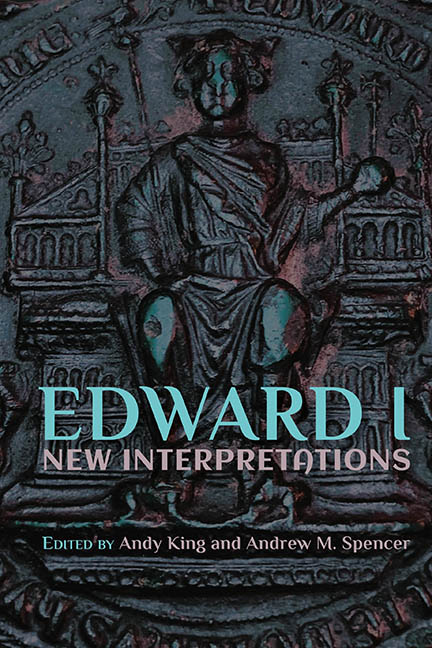Book contents
- Frontmatter
- Contents
- List of Contributors
- Acknowledgments
- Abbreviations
- Genealogy of Edward I
- Introduction
- 1 The Lord Edward and the Administration of Justice across his Apanage, 1254–72
- 2 A Tale of Two Ministers: Robert Burnell, Walter Langton and the Government of Edward I
- 3 Law and Order in the Reign of Edward I: Some New Thoughts
- 4 Magnates, Ritual and Commensality at Royal Assemblies: Bogo de Clare and Edward I’s Easter Parliament, 1285
- 5 Royal Daughters and Diplomacy at the Court of Edward I
- 6 Hearts and Bodies: Edward I and the Scottish Magnates, 1296–1307
- 7 Edward I and the Blessed Virgin Mary
- 8 Letters and Political Discourse under Edward I
- 9 Crisis? What Crisis? 1297 and the Civil War that Never Was
- Index
Introduction
Published online by Cambridge University Press: 21 March 2020
- Frontmatter
- Contents
- List of Contributors
- Acknowledgments
- Abbreviations
- Genealogy of Edward I
- Introduction
- 1 The Lord Edward and the Administration of Justice across his Apanage, 1254–72
- 2 A Tale of Two Ministers: Robert Burnell, Walter Langton and the Government of Edward I
- 3 Law and Order in the Reign of Edward I: Some New Thoughts
- 4 Magnates, Ritual and Commensality at Royal Assemblies: Bogo de Clare and Edward I’s Easter Parliament, 1285
- 5 Royal Daughters and Diplomacy at the Court of Edward I
- 6 Hearts and Bodies: Edward I and the Scottish Magnates, 1296–1307
- 7 Edward I and the Blessed Virgin Mary
- 8 Letters and Political Discourse under Edward I
- 9 Crisis? What Crisis? 1297 and the Civil War that Never Was
- Index
Summary
He was lord of England,
And a king who well knew war;
None could read in any book
Of a king who better upheld his land.
All those things he wished to accomplish,
He wisely brought to an end.
WHILE Edward's place among the more successful of England's medieval monarchs has remained secure since the above lines were penned in the aftermath of his death in 1307, his reputation among scholars of medieval England has to some extent waxed and waned. Bishop Stubbs, the leading English medieval historian of the late nineteenth century, had no doubt of Edward's greatness; and for the ‘Whig’ school of history, his reign represented the pinnacle of English constitutional achievement in the Middle Ages (a characterisation accurately skewered by Sellar and Yeatman's chapter on Edward, headed ‘A Strong King’). Edward's work, Stubbs argued:
was crowned with the success that patience, wisdom, and faith amply deserve, and his share in the result is that of the direction of national growth and adaptation of the means and design of government to the consolidation and conscious exercise of national strength. He saw what was best for his age and his people; he led the way and kept the faith.
Edward's reputation remained high in the early twentieth century, though Frederick Tout was less forgiving of the king's autocratic tendencies than was Stubbs.5 His standing reached its zenith, however, under the admiring gaze of Maurice Powicke, who had been taught by Tout in Manchester before working alongside him there in the 1920s, though it was during his time in Oxford that he began to write extensively on the thirteenth century. Both Henry III and the Lord Edward (1947) and The Thirteenth Century (1953) saw Powicke describe Edward in glowing terms:
He lived intensely in conformity with the ideas and tendencies of his time, and found independence in applying them with vigour and precision. He was autocratic not in opposition to them but in full accordance with them … considering how busy he was, how incessant were the calls on his judgement, and how much self-seeking and conflicts of interest lay beneath the discipline of daily routine in every form of the life about him, he was a very great king.
- Type
- Chapter
- Information
- Edward I: New Interpretations , pp. 1 - 8Publisher: Boydell & BrewerPrint publication year: 2020

